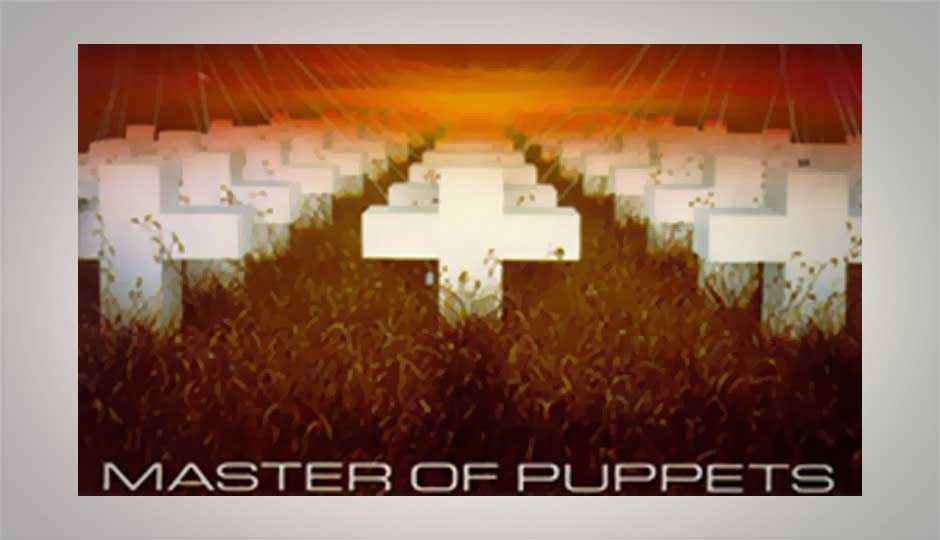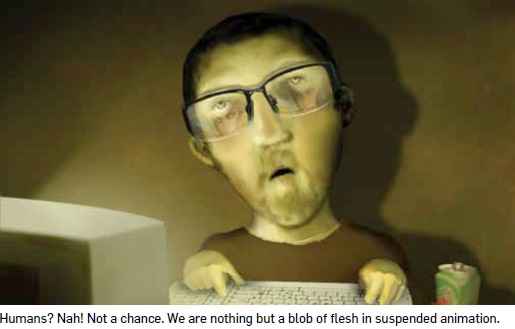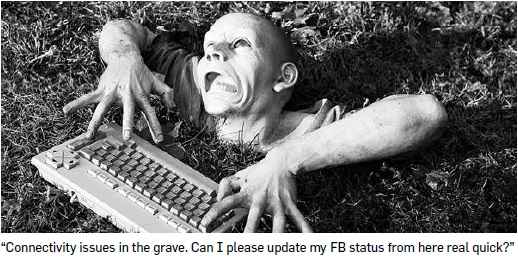Are you a master of or a slave to technology?

Are we slaves to our own technology? Sometimes it's difficult to tell who's master who's the slave. Read on for a meta report on the way things are going currently.
Humanity has never had it this easy. The internet has an answer for every question. Smartphones help us navigate so we are never really lost. Even the leisurely decisions like discovering the best of books, music, art, education, careers and life partners can be found with just a few clicks or taps of a screen. And with wearable technology like Google Glass and Oculus Rift, we can be constantly connected to all that information – sedately immersed in the assured comfort that we can know anything, anytime, anywhere.
Wait. Just one second. Did you feel that? I think a phone just buzzed. Or wait. Maybe it was yours. Better check – just to be safe. Sound familiar? Don’t panic. The phantom phone phenomenon is more common than you think – according to Pew research more than 66 percent of cell phone users compulsively check their devices for missed calls, alerts, messages even when it’s not ringing or buzzing. Users are also consuming four times as much information as fifty years ago, checking their phones on average 37 times per hour, consuming 12 hours of media and viewing over 40 websites per day.
So, are we really in control of all that information or are we just puppets being strung along by the digital powers that be? OK, maybe we should panic.
Frankenstein lives!
Nearly twenty years ago, the internet was a niche tool designed for cutting-edge academia in select nations, that went on to become a medium for people across the globe to wonder “sometimes i wished i was white so i can understand doctor who” (seriously, Google it). And even though the effects of other technologies have been studied, as in the case of electricity, radio or television – never before has any technology found such an intimate relationship with users in such a short period of time. The internet, smartphones and tablets have gone on to become the most popular technologies faster than any other in history, achieving in less than 5 years what took electricity nearly 40.
This remarkable shift has had many benefits to humanity. From entertainment to health-care there is no aspect of modern society untouched by the vast expanse of services provided by internet technology. And companies like Facebook and Google have become the hegemons of facts, information and even personal taste – a Frankenstein like Chimera of our own making, evidence of our own indifference to how we are used on the web by corporations.
Scientists have already begun to research changes in the way people think and behave when exposed to the bombardment of emails, tweets, social media messages, online advertising and other online stimulants. The ability for the mind to focus diminishes with longer exposure making us a slave to the dopamine (pleasurable neurotransmitter) excitement received every time we see an alert seeking our attention. In essence making us addicted. Are we the masters or the puppets?
And as Google registers our location via our phone or profile information it presents results it considers relevant to us. That makes our life more convenient. When we’re looking to shop online, websites like Amazon process our past buying behaviour and present us with options suited to our tastes. That makes our decisions faster. At every step technology steps in to save us time and energy. And we love it.
The cycle of rationalisation is complete. We’re not addicted, we just need it.
Puppets to our own system
The world as we know it is now wired to work with us on the grid. Technology in all its forms is leveraged in visible and invisible ways to make life easier, faster, more productive and far more appealing online. Even if it is at the cost of safety and privacy.
Case in point: a network failure can collapse an entire power grid for millions of people (Northeast Blackout of 2003 in the United States), a software glitch can get people killed (South African robotic cannon accident of 2007) and social media websites can track and leak personal data (Facebook “shadow profile” leak of 2012) but aren’t these just occasional accidents in an otherwise upward trajectory of progress? Maybe.
The advent of electricity was followed by a generation filled with the intellectual battle between Edison and Tesla, which eventually gave birth to modern power.
And even the computer age saw its detractors, who doubted if there was even a market for personal computers, We shifted technology from an intellectual exercise with commercial benefits into a purely commercial one – with the belief that consumers would pick that which served the highest utility. Perhaps naively forgetting that adage that holds true above all else on the internet – an individual is smart and intelligent, but people are dumb as a sack of doorknobs.
Understanding our own monster
As has been true in history, a handful of people have often times created the most tectonic of shifts in human history, while the rest have benefited off it without realising the significance of the discoveries. How many of us can clearly explain how fire functions? Or explain the basic theory of electricity? Or even the difference between a UNIX kernel and a Microsoft’s
hybrid kernel?
These fundamental cornerstones of our day to day existence still escape simple understanding among the general public. And it is the taste and preferences of the general public that technology companies rely on to lead technological innovation! Carl Sagan once said, “We live in a society exquisitely dependent on science and technology, in which hardly anyone knows anything about science and technology.” This statement has never been truer.
In addition to this ignorance we are overwhelmed with the avalanche of information that is out there. Companies like Google tell us that they are working to make our online existence easier by organising and curating all this information using algorithms. These algorithms as we know run on computational mathematics applied to a vast number of data points in real time to connect us with the right content. In other words, doing our thinking for us.
Filter bubble: Escaping the gilded cage
Most users don’t even consider the vast amounts of information hidden from them as they navigate the web usingGoogle. Attempting other search engines (try DuckDuckGo) can give us a shocking and uncomfortable insight regarding the extent to which we are denied different parts of the web.
Even browsing through our Facebook news feed is a controlled experience. By observing, tracking and storing our click-preferences over a period of time, Facebook algorithms would only present information that it thinks we would like – an edited fragment that would give us the illusion that the world we’re a part of is exactly attuned to our views. This phenomenon of living in a bubble (read: The Filter Bubble: What the Internet Is Hiding From You by Eli Pariser) is no different than zoo animals who become so acclimated to captivity that the wild becomes a threat to survival.
Stop to smell the unintended consequences
Growth has a cost and it is called “unintended consequences”. We know that. But none of these setbacks have hampered the drive to move forward. They have only served us lessons on how to do so with greater care and caution – but only if we remember our past. Just as this story was being written Google bought an advanced robotics company (Boston Dynamics) which has military contracts. Other companies like Intel are already exploring quantum and molecular processors that have the ability to break Moore’s law in half. And in August the University of Washington discovered a way for a non-invasive human-to-human brain interface which allowed one researcher to transmit brain signals via the internet to control the hand motions of another researcher.
Try not to be distracted by the slick user interface, the easy user experience and the immediate gratification that the system is designed to provide – in many cases by sheer force of personality (Steve Jobs circa 2007). Think and look at how the convergence of disparate technologies – in computers, robotics, biotechnology, medical sciences and even agriculture are headed towards the potential for immense fallout of unintended consequences. Combine that with the already widespread ability of algorithms made to do our thinking for us and we’re left with a perplexing thought – is all this going to better humanity?
But who decides what’s better anyway? Is it intrinsically better to live in sanitized environments? To rely on automation for our basic needs? To live unusually long lives thanks to technological advancements? It may seem obvious that the answer to all these questions is YES, but consider for one moment that the future can take many forms; the near egalitarian harmony of 24th century Starfleet or the ancient cruel hegemony of Battlestar Galactica. Only our level of engagement decides which one it will be.
Our own way forward
To substitute consciousness, chaos and choice with the safety of algorithmic determinism are surely the decisions of a coward and a fool. The capacity for humans to learn from an iterative evolution of thought is unparalleled by any technology. In terms of sheer energy efficiency the human brain consumes only 20 watts per hour as compared to IBM Watson that consumes 350,000 watts. So far, we’re still winning.
But more than that, even in its highest possible form (A.I’s like Watson, Chinook, Quackle) technology can’t evolve a separate ethics, morals and cultural norms. It is rigid and takes its cue from its “maker”. And even though 95 percent of humans believe in a “maker” (see: god) of their own, they’re free to disobey and rebel – would we be willing to extend the same ability to our silicon counterparts?
Unlikely. Since the unthinkable result of doing so is that all the data, analytics, intuitive programming, geo-location information, behaviour predictions and personal data attributes might end up in the hands of a future Skynet or worse an elite group of humans. There is no way to really know for sure. But there are surely some signs.
The human imagination can foresee its own flaws through its art and culture, and for technology, science fiction has always been an honest expression of our fears. The one thing it has taught us is that a unilateral dependency on technology that dismisses the core of humanity is fraught with failure.
As is evident from the arguments so far – the discussion over how deeply tied we are to technologies isn’t filled with as many answers as it is questions – but that is the freedom we enjoy in the absence of machine control. And we can only discover answers, if we explore the world around us and not be slave to our own digital avatars.



